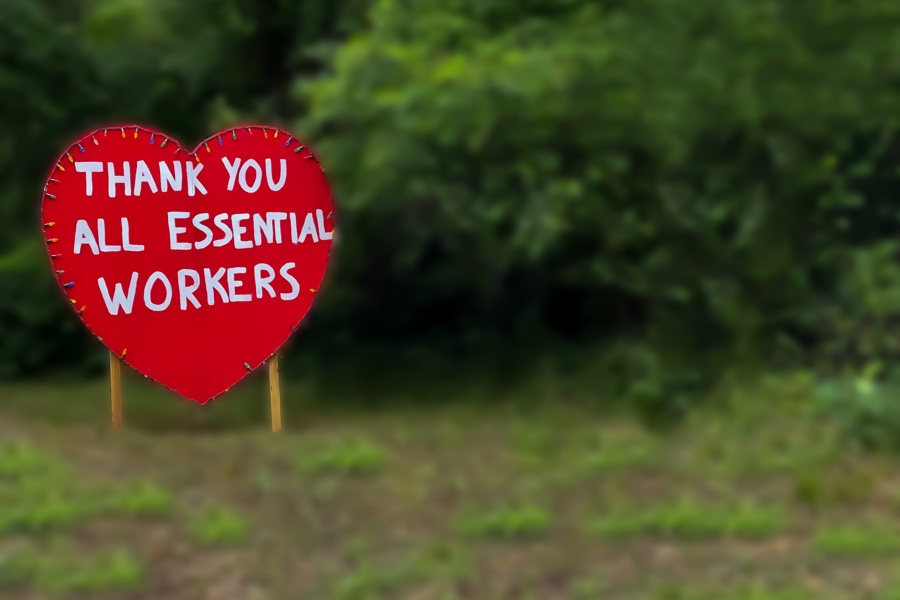The Pandemic Will End. Our Respect for Service Workers Should Not
My return to the movie theater came with an epiphany about how I'm going to conduct myself when things return to "normal."

As a culture, we revered service workers during the pandemic. That shouldn’t stop when it’s over. Photo via Getty Images
Last weekend, my fiancé and I went to the movies together for the first time since the pandemic started. From the time we began dating, we always made it a point to go to the Ritz to watch every Best Picture nominee. For our return to the theater, we went to see Minari, an Oscars front-runner that we couldn’t stream at home. I was expecting the experience to be cathartic. I didn’t expect to walk away with an epiphany about humanity.
We had debated whether it was too soon to be enclosed indoors for an extended period of time. Although we’re both vaccinated, most of our recent outings have been outdoors or inside heavily ventilated restaurants. But once we entered the theater, the instant “welcome back” energy that filled the building killed any hesitation we had. The ticket-taker greeted us with a wide smile as he struck up conversations with guests about how timely this Korean-American film was.
It was a perfect Sunday matinée that felt like life before CDC guidelines dictated our every action. Sure, sections were blocked off to enforce social distancing — but who wants to be too close to other people while watching a film anyway? It wasn’t until we were exiting the theater and one of the concession workers humbly told guests “Thank you for returning” while opening the door for us that it struck me: I had truly missed the kindness of strangers.
Recently, there’s been a wave of social media declarations and manifestos about how we don’t have to be the same people going forward. Some people have professed anxiety about returning to life as we knew it. For me, the lack of social interaction made me think about the structural changes I would make to my life post-pandemic: I pledged to conserve my time/energy, avoid typical racial profiling triggers (such as going to the grocery story, or debating with racists on social media), and sleep more. But I hadn’t really explored how I might change personally — how my own character might change. My weekend moviegoing triggered this introspection; it made me think deeply about how my interactions are shaped by others — and what I want to do more of as COVID fades. After a year when many of us focused on self-care out of necessity, it’s time to care for others, now that we can actually interact with them.
That “thank you” from the concession worker had a different weight than it would have last year. Through the pandemic, while cops were getting paid excessive overtime and I got to work from home and be all Carrie Bradshaw “couldn’t help but wonder” at my laptop, lots of service workers like him were either putting themselves on the line or getting laid off, furloughed, or having their pay cut. People like him are the true heroes of the pandemic — and he was thanking me.
It became part of the culture during the pandemic to tip more and buy local to support those who were being hit hardest. (I’m still trying to figure out how to use all the gift cards I bought to keep the lights on at some of my favorite restaurants.) But even as the economy begins to improve, I don’t think I, or we, should dial back the generosity we showed service workers during the pandemic. Though many of us had the privilege to gripe on social media while bingeing Netflix, cooks, cleaners, teachers, doctors, nurses, drivers, delivery people, cashiers and others kept the world running for us. We can’t let ourselves quickly forget that. We need to continue to hold them up as heroes in the same way we’ve exalted firefighters, soldiers, dignitaries and clergy (and the way some still regard police officers). I think those who selflessly served us deserve that. It took a lot of humility and courage to show up to a job and earn the faith of customers throughout a crisis these workers didn’t create. Showing up for them now is the least we can do.
Before going back out, I spent so much time thinking about how the pandemic had changed my life. But now that I’ve engaged with people more, laughed with strangers, and felt the hospitality of service workers, post-pandemic life has shifted my focus on how I plan to be better to others. I read so many deep, meta self-reflective pieces that took up so much space in the conversation. I will never be against self-care, but after several months of self-preservation — of my sanity, health and wellness — I’m blessed to be able to pour some of my good fortune into others again. And going forward, I’m going to do it more frequently and intentionally.


